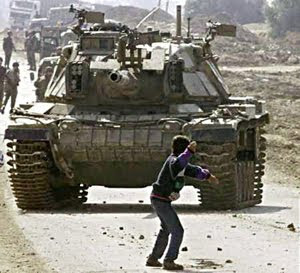Sunday, 22 August 2010 11:26
WASHINGTON--Today the former head of the Palestinian negotiating team asserted the rigth of Palestinian refugees to return to their homes.
LISTEN |
| Protesters take to the streets in New York City one day after Israel's raid on the Freedom Flotilla. |
| From: | Z Net - The Spirit Of Resistance Lives |
|---|---|
| URL: | http://www.zcommunications.org/from-istanbul-outrage-over-a-massacre-on-the-high-seas-by-phyllis-bennis |
Women of Colour in the Global Women's Strike Crossroads Women's Centre 230A Kentish Town Road London NW5 2AB Tel: 44 (0)20 7482 2496 womenofcolour@allwomencount.net www.globalwomenstrike.net We call on Joan Armatrading, as a woman of colour who wrote a tribute to and performed for Nelson Mandela, and whose website says, “South Africa has always been close to my heart”, not to play Israel. As we write, people are gathering worldwide, thousands in London alone, to protest the Israeli piracy and murder of at least 20 unarmed people taking part in a humanitarian mission bringing aid to blockaded Gaza. These unprovoked killings are the latest in a long line of atrocities by Israel, which has shown itself to be one of the most violent and racist regimes on the planet. Archbishop Desmond Tutu – a leading proponent of boycott, divestment and sanctions against Israel – has written: “I have been to the Occupied Palestinian Territory . . . I have witnessed the humiliation of Palestinian men, women, and children . . . and this humiliation is familiar to me and the many black South Africans who were corralled and regularly insulted by the security forces of the Apartheid government.” Palestinian people have been dispossessed and their lands occupied; they have been walled in, imprisoned, starved and bombed by Israel. Israel is still building the apartheid wall inside the occupied West Bank, separating families, dividing farms, villages and towns, and starving Gazans, in addition to building Jewish-only settlements and Jewish-only roads on Palestinians’ land. Palestinian women have borne much of the brunt of this violence – including at security checkpoints, in prisons, and trying to fight for and protect their imprisoned young children. In their day-to-day work in the family and in the fields they have kept communities together in the face of poverty, hunger, injury and death – enabling communities to resist, despite intimidation and corruption, and to oppose expulsion from their homes and land. Women’s survival work is thus the backbone of resistance. Palestinian people have called for our support against genocide and occupation. This includes a boycott of goods, culture, and education – everything that empowers and promotes the Israeli state against them – and us. Gill Scott-Heron and Elvis Costello very recently pulled out of concerts there, in recognition of the struggle of Palestinian people and their refusal to be used to undermine it. Costello said: "There are occasions when merely having your name added to a concert schedule may be interpreted as a political act that resonates more than anything that might be sung and it may be assumed that one has no mind for the suffering of the innocent." Nothing you can say would justify your playing in Israel. UK’s Massive Attack is among the increasing number of groups which respect the boycott, refusing to play Israel no matter what blood money the Israelis offer. They understand that going there lends credibility to Israel’s occupation and genocide, and would permanently stain their artistic reputations. Multi-racial demonstrations – by Palestinian and Israeli, Afro-American, Indian and European people – held in many UK cities are supporting and reinforcing the cultural boycott. People may think what happens in Palestine is out of sight or off the grid, but the eyes of the world are watching, and many voices in many languages cry out in protest. Your concert planned for June 5th is the anniversary of the beginning of the so-called Six-Day War in 1967 when Israel occupied the West Bank, the Gaza Strip, East Jerusalem, the Golan Heights, and the Sinai desert, and ethnically cleansed thousands of Palestinian people from the West Bank. For many it was a second expulsion – in 1948 over half the Palestinian population had been expelled from their own cities and villages. This makes it even more crucial that you pull back from this disastrous step. We urge you to consider thepowerful statement by PACBI. Your proposed concert is also scheduled a year and half after the horrendous and brutal punishment bombing of Gaza where over 1400 women, children and men lost their lives, and thousands of homes, schools and hospitals were destroyed. Support for Palestinian people has never been more urgent or more vital for the entire anti-racist struggle to establish that we humans are all entitled to the compassion and support of others. Those of us who have also suffered racism have a special responsibility to demonstrate support and compassion to people of colour whose lives are on the line. Sister: don’t turn your back on fellow sufferers; and don’t force your loyal fans to turn their backs on you. Don’t help Israel whitewash its atrocities. Use your status as president of the ‘Women of the Year Lunch’ and as a world-famous singer-songwriter to take a stand with Palestinian sisters and brothers and with all of us fighting for justice. We are with the many thousands outside the UK Parliament chanting: “In our thousands, in our millions, we are all Palestinians.” Please help us get the word out: circulate this widely in your networks and ask your group or organisation to endorse it. Write to Joan Armatrading at: Email: admin@armatrading.co.uk Write to her record label: email address: inquiries2@sigmusicus.com http://www.429records.com/sites/429records/contact.asp Phone: Santa Monica, CA, USA: 310-451-0451 |
